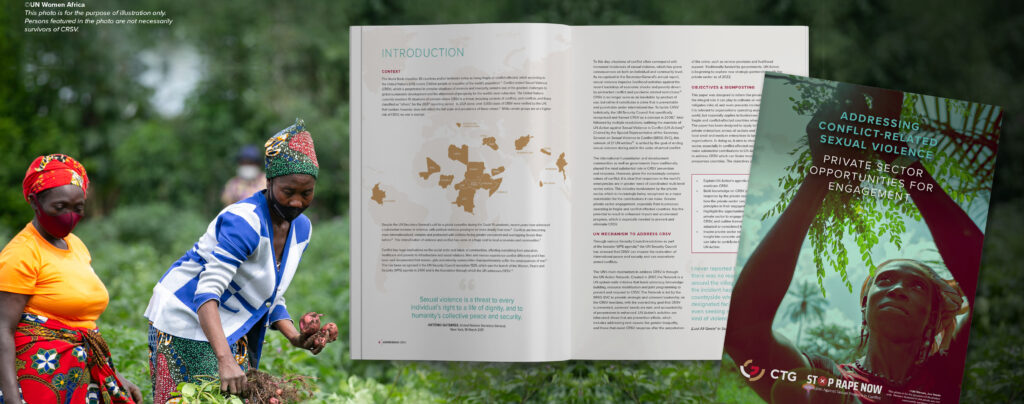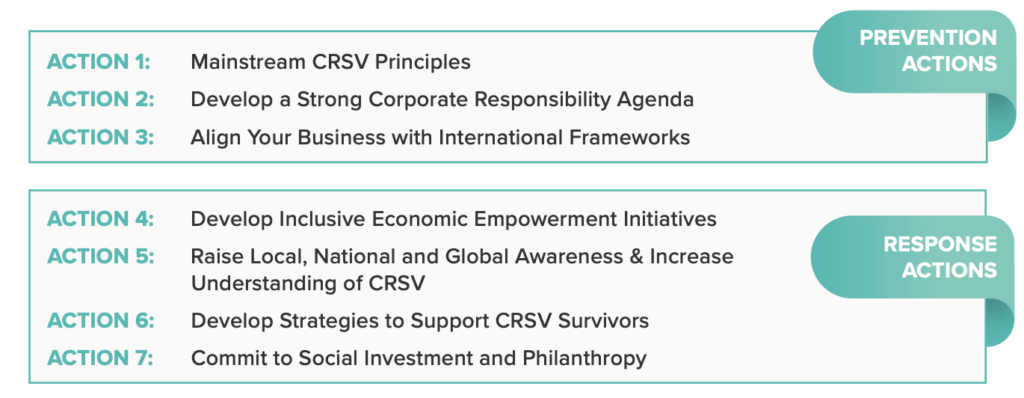White Paper: How The Private Sector Can Help Eradicate CRSV
READ OUR WHITE PAPER, ADDRESSING CRSV: PRIVATE SECTOR OPPORTUNITIES FOR ENGAGEMENT
CTG is honoured to have collaborated with UN Action against Sexual Violence in Conflict (UN Action) to publish a white paper highlighting how the private sector can help to prevent and respond to Conflict-Related Sexual Violence (CRSV). This white paper is the first of its kind, setting out practical suggestions and sharing ideas that can be adopted by the private sector.
The paper presents 7 key actions that can be taken by any private-sector organisation to support the United Nation’s strategic goal to eliminate CRSV. Using a straightforward action-oriented approach and compelling case studies, it marks the start of an exciting journey. Using this information, the private sector can better understand how to realign their tools and resources to deliver an even stronger positive impact in conflict-affected countries and help foster a safer reality for some of the world’s most vulnerable communities.
Chaired by the Special Representative of the Secretary-General (SRSG) on Sexual Violence in Conflict and Under-Secretary-General, Pramila Patten, UN Action has been uniting efforts across the UN System to eliminate this crime. Bringing together the collective experience and institutional capacity of the UN System they now seek further contributions and action from the private sector to accelerate progress.
CRSV is a crime against humanity that impedes the development of conflict-affected communities and typically targets women and girls. Achieving SDG5 lies at the heart of CTG’s Shared Value Strategy and is a key focus for our business operations. We are proud to be leading advocates for the private sector’s involvement in eliminating CRSV.
Launched in New York at an event during the 77th Session of the United Nations General Assembly (UNGA77), the white paper had an excellent response from many UN, Member States, NGOs, and business representatives from across the world.
SEE THE WHITE PAPER HERE, and read on for an overview of CRSV, what UN Action is doing and how you can help.
Private Sector Opportunities for Engagement
This white paper outlines 7 straightforward but concrete actions that businesses can take to support the strategic goals of the United Nations and its Member States to eliminate CRSV. The actions are divided into two focus areas:
- Prevention: Exploring how within its remit, the private sector can play a role in addressing root causes of CRSV such as social and gendered inequalities. This involves turning inwards to ensure businesses are minimising further risk to survivors and their communities through the application of their operations.
- Response: In this subsequent section, the paper explores more specific actions that the private sector can adopt to more acutely align business activities and operations to support UN Action. These include promoting inclusive economic empowerment; raising local, national and global awareness of CRSV; developing business strategies to engage with and support CRSV survivors; and providing UN Action and the CRSV Multi-Partner Trust Fund with social investment and philanthropic support.
Organisations Driving Change
Under each step, the white paper provides compelling case studies showing a wide range of businesses of different sizes across the world already putting these steps in action. Some of these include:
Congo Clothing Company: An organisation using fashion to raise awareness and provide philanthropic support to CRSV survivors.
Bèkske: A Fairtrade coffee brand supporting over 75 Rwandan entrepreneurs, most of which are CRSV survivors by selling their coffee and ensuring proceeds return to their pockets.
Clifford Chance and Baker McKenzie: Organisations offering pro-bono legal support directly and indirectly to survivors of any form of sexual violence.
Survivor Inclusion Initiative: Driven by banks such as Barclays and Bank of America, this initiative strengthen’s survivors access to basic banking services.
[Survivors] make the link between their physical insecurity and economic and food insecurity and share with me how economic support fosters self-sufficiency, self-esteem, and resilience.
Pramila Patten, Special Representative for the Secretary General on Sexual Violence in Conflict

CTG’s CEO Alice Laugher and Shared Value Manager, Mia Zickerman-White at the launch event in New York.
What is UN Action?
Chaired by the SRSG on Sexual Violence in Conflict Pramila Patten, UN Action is a network of 21 UN entities. United with the goal of ending sexual violence during and in the wake of armed conflict, UN Action aims to:
- Prevent conflict-related sexual violence (CRSV)
- Enhance accountability
- Meet the needs of survivors of sexual violence
What is Conflict-Related Sexual Violence?
In 2021 alone, over 3,000 cases of CRSV were verified by the United Nations; that number, however, does not reflect the full scale and prevalence of these crimes. While certain groups are at a higher risk of CRSV, no one is exempt.
CRSV is defined by UN Security Council resolution 1820 (2008) as sexual or gender-based violence ‘when used or commissioned as a tactic of war to deliberately target civilians, or as part of a widespread or systematic attack against civilian populations’, which may impede the restoration of international peace and security. CRSV is defined and recognised by its context, causes, motives and survivors, which differentiates it from gender-based violence (GBV). Under international law, CRSV is a war crime, crime against humanity, form of torture and can be an act of genocide.
I never reported the incident as there was no reporting facilities around the village. On top of that the incident happened in the countryside where there were no designated facilities for reporting or even seeking medical care for such kind of violence.
Testimony from Luul Ali Geele*, CRSV Survivor in Somalia
Why Do Private Sector Contributions Matter?
The international community, as well as governments , continue to play a huge role in CRSV prevention and response. However, the complex nature of conflict has shown that a wider multi-stakeholder response which includes the private sector’s involvement is needed. Businesses are increasingly being recognised as a major partner in achieving global peace and development with their engagement having the potential to enhance impact and accelerate progress. As the world’s largest employer, the private sector can play a pivotal role in eliminating CRSV such as by addressing root causes which include gender and other social and economic inequalities. By adopting practices that promote cultures of inclusion and respect, businesses can help reduce or eliminate behaviours and social practices that perpetuate CRSV in the wider community.
An Undeniable Business Case
Beyond the moral imperative, business adoption of practices that support the eradication of CRSV make business sense. Not only do businesses centred around a culture of rights, inclusion and respect often outperform their peers, they also have the potential to foster more stable and prosperous societies, offering strong opportunities for business growth and performance. Furthermore, taking action to eradicate CRSV directly aligns with the Sustainable Development Goals (SDGs), which are becoming an increasingly important consideration for businesses worldwide. This especially applies to SDG 1 No Poverty, SDG 5 Gender Equality, SDG 8 Decent work and Economic Growth, SDG 10 Reduce Inequalities and SDG 16 Peace, Justice and Strong Institutions.
What Can You Do?
While level of impact and extent of engagement may differ depending on the size, resource capabilities and location of private sector businesses, the seven actions outlined can be considered and adopted by businesses of any nature. They are founded on the promotion of human rights, with a specific focus on taking action to promote the economic empowerment of survivors and their communities to foster greater independence, resilience and recovery.
In the wake of this publication, CTG urges businesses to reflect inwards to examine which, if not all, of these prevention and response actions, can be implemented to fulfil the private sector’s increasing responsibility as a key player in global development.
We invite you to read the white paper here and welcome the opportunity to further discuss with you how we can work together to help eliminate sexual violence in conflict for good.


